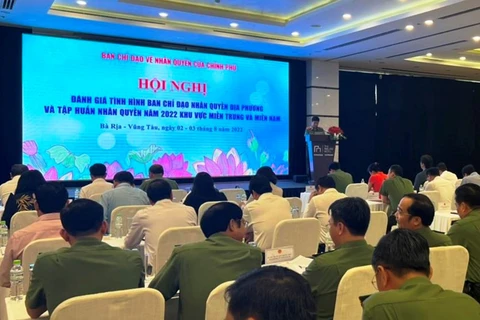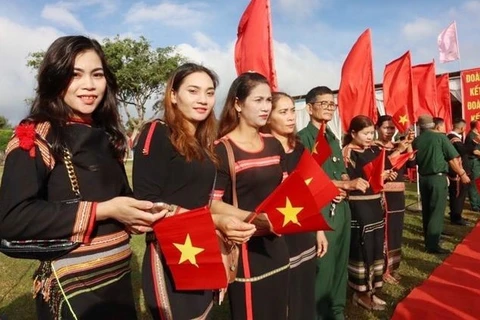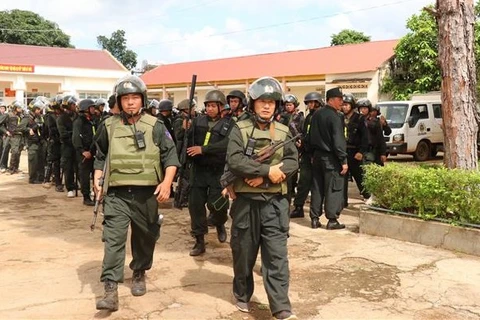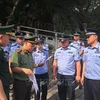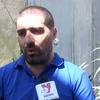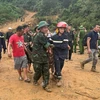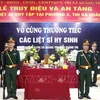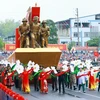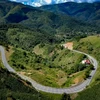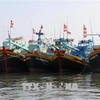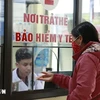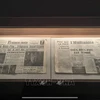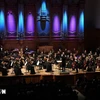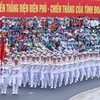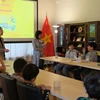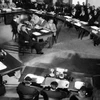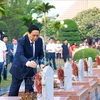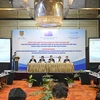
Hanoi (VNA) – One of sabotage ruses of hostile and reactionary forces is to take advantage of religious affairs to incite followers and people to disturb political stability and social order and safety, thus creating pretexts for external interventions to sabotage Vietnam.
Particularly, in ethnic minority and remote areas, those forces often make use of religious and ethnic affairs to provoke hatred and drive a wedge into the great national solidarity. Regreatfully, their ruses have been supported even by some international organisations lacking goodwill towards Vietnam, including the US Commission on International Religious Freedom (USCIRF), and some websites.
In its latest report released in June 2023, USCIRF continued to repeat erroneous, one-sided, and groundless assessments of religious freedom in Vietnam when saying the country has violated the freedom of religion. It has also recommended the US Government put pressure on Vietnam in this regard.

It is surprising that the USCIRF report was issued right after a USCIRF delegation’s fact-finding trip in Vietnam in late May. Leaders of the Vietnamese Ministry of Public Security received the visiting delegation, had straightforward and open discussion, created conditions for the delegation to learn more about the religious freedom situation in the country, facilitated their working sessions with local administrations and religious dignitaries, and provided them with detailed and precise material.
Given this, it could be said that USCIRF has intentionally turned a blind eye to the fact that guaranteeing the freedom of belief and religion, promoting solidarity among religious organisations, dignitaries and followers, and encouraging them to contribute to national construction and defence form a consistent policy of the Vietnamese Party and State.
As of 2022, the State recognised 43 organisations of 16 religions, with about 27 million followers, more than 53,000 religious dignitaries, some 135,000 assistants, and over 29,000 places of worship. More than 8,000 festivals linked with beliefs and religions take place each year, drawing tens of thousands of followers. During 10 years enforcing policies and laws on belief and religion, competent state agencies have granted hundreds of hectares of land for the building of places of worship.
Hostile forces have also tried to attribute the armed attacks on the two communal People’s Committees and civilians in the Central Highlands province of Dak Lak on June 11 to religious and ethnic reasons.

The RFA has continually broadcast interviews with some persons proclaiming themselves Mong ethnic people or Thuong (Highlanders, Montagnard) who were victims of religious persecution forced to flee, or cited several unnamed persons with such titles as “a construction contractor in the Central Highlands”, who alleged that the Dak Lak incidents were “acts of resistance by the Central Highlands Protestants whose belief was persecuted” or “prolonged ethnic tensions”. They distorted the nature of the issue by saying “Kinh people oppress Thuong people” or “Kinh people occupy land of Thuong people”, or seize the economic difficulties in the region or some shortcomings in local administrations’ governance to fabricate stories about “discrimination among religions and ethnic groups in Vietnam”.
The Voice of America (VOA) cited Nguyen Dinh Thang, head of the so-called Boat People SOS (BPSOS) – a reactionary organisation based in Virginia, the US, that is behind the Dak Lak attacks, as parroting that the administration forced Thuong people in the Central Highlands to abandon their religions, and that “ethnic minority people do not yield to Kinh people”.
This is not the first time Vietnamese authorities have uncovered and thwarted plots of reactionary organisations that hide under the cloak of religion such as Degar Protestantism or the Evangelical Church of Christ in the Central Highlands established by the exiled Fulro members in the US. Those organisations colluded with reactionary elements in Vietnam to incite credulous people to cause protests and political disturbances.
In particular, a series of sabotage incidents taking advantage of Central Highlanders’ beliefs and religions were directed by exiled reactionary organisations like BPSOS. Over the past years, BPSOS has connived with other reactionary ones like the Montagnard Stands for Justice and the Evangelical Church of Christ in the Central Highlands to train some people with dissent thinking so as to form illegal religious associations and groups as the tool to build up forces for their sabotage plots against Vietnam.
At the high-level conference of heads of counter-terrorism agencies held by the United Nations in New York from June 19 to 22, Maj. Gen. Pham Ngoc Viet, Director of the Ministry of Public Security’s Homeland Security Department, said one of the external terrorism risks that may harm Vietnam’s national security is that exiled reactionary Vietnamese organisations and extremists based in some countries have taken advantage of ethnic and religious affairs, set up bases and affiliates, provided training for some persons in Vietnam, and sent their members to enter Vietnam to direct the implementation of terrorist acts in the country.
Such incidents as the recent ones in Dak Lak have shown this risk. Reactionary and hostile organisations’ distortions and abuse of religious and ethnic affairs to instigate disturbances were acts of lending a hand to terrorism.
Dak Lak and Central Highlands residents’ response to the incidents is a trenchant reply refuting those organisations’ cunning arguments. Local people have actively assisted police in chasing and arresting culprits, or encouraged the relatives involved in the attacks to turn themselves in. Many have also donated food and water to the police officers on duty. The concrete and practical acts by Dak Lak residents have affirmed their solidarity and determination to fight sabotage plots of hostile forces.
In recent years, provinces in the Central Highlands have recorded comprehensive results in socio-economic development. The size of their economy in 2020 rose by some 14-fold from 2002, the economic growth rate averaged 7.98% during 2002 - 2020 (the highest among all regions), while per capita income surged 10.6 times.
Besides, the material and spiritual life of ethnic minorities have been improved substantially. About 2.3 million followers of different religions in the Central Highlands have had their right to freedom of belief and religion guaranteed, as well as legitimate demand and aspirations met. Religious followers have also been facilitated to engage in the socio-economic development process.
Over the past decades, many religions have been introduced to and developed strongly among ethnic minorities in the Central Highlands. Religious followers have actively taken part in social activities, the revitalisation of traditional cultural spaces, along with the preservation of languages and scripts of local ethnic groups. Cultural values of religions have also been accepted and upheld by part of the people in the Central Highland, helping eliminate backward customs.
The effective implementation of policies on religious and ethnic affairs in the Central Highlands has helped inspire and promote locals’ sense of solidarity, thereby defeating hostile forces’ plots to sow division.
The State of Vietnam has always respected and protected the right to freedom of belief and religion in line with law, and also prohibited any acts taking advantage of religious affairs to commit law violations and infringe the rights and legitimate interests of the State and citizens.
USCIRF and some Western media outlets’ erroneous and distorted assessments of the religious freedom situation in Vietnam are just like acts of lending a hand to reactionary organisations which carry out sabotage and terrorism in the name of religious freedom./.

